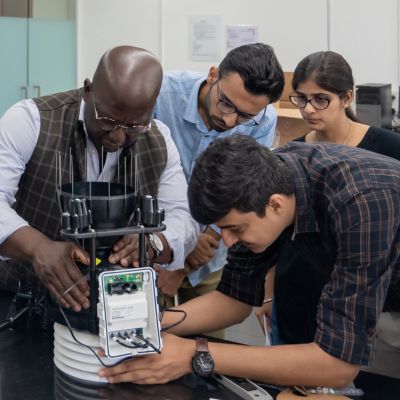The Climate Institute at Ahmedabad University aims to generate transformative solutions by integrating science, engineering, AI/ML, policy, and community engagement. We are committed to advancing an interdisciplinary approach to address the pressing challenges posed by climate change and environmental degradation. Air pollution, for instance, is shaped by diverse emission sources, atmospheric dynamics, and intricate chemical reactions. Climate change adds additional layer of complexity to these processes and their mutual interactions. At local and regional scales, the impact of climate change is even more tangible, and together with worsening air quality, and decreasing water availability, poses heightened public health risks.
Understanding and addressing these challenges is complex. India remains especially vulnerable and ranks among the lowest on the Environmental Performance Index (2022), with 10 of the world’s 15 most polluted cities. The Air and Climate Research Laboratory, at the Climate Institute, is taking an interdisciplinary approach, combining ground-based and satellite measurements with advanced modelling to inform policy and public health decisions. Key areas of focus include the impact of Short-Lived Climate Forcers (SLCFs) on air quality and health, AI/ML in air quality forecasting, Industrial emissions treatment, and region-specific air quality modelling for the Global South.
Climate change is placing unprecedented stress on water systems, manifesting through prolonged droughts, erratic precipitation patterns, and increasing incidents of urban flooding. In response, our research is focused on developing sustainable, low-emission, and energy-efficient water treatment technologies that can be applied across both rural and urban contexts. These innovations are evaluated not only for their effectiveness but also for their environmental implications, particularly their carbon and water footprints, to ensure that improvements in water quality do not further exacerbate climate challenges. This dual emphasis on technology development and environmental assessment supports solutions that are sustainable and climate resilient. Building on this foundation, Ahmedabad University in the process of establishing a dedicated Water Quality Lab that will serve as a hub for interdisciplinary research. By bridging environmental engineering, climate science, and health research, the lab aims to support policies and infrastructure planning grounded in real-world data and environmental responsibility. A key part of this future work will involve expanding the use of water footprint accounting to identify climate-sensitive water uses, such as those in agriculture and industry, thereby enabling adaptive and forward-looking water policy.

Air Quality Measurement and Modeling
Water Solutions
From Air to Water: Climate Connections and Policy Pathways